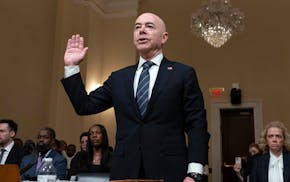WASHINGTON - More than a decade after Sen. Paul Wellstone's death in a plane crash -- and more than four years after Congress passed a landmark mental health law bearing his name -- the signature achievement of his political career remains unfinished.
Until now.
With the nation reeling over the shootings of elementary school students by a deranged gunman in Newtown, Conn., Wellstone's family and friends say they are close to completing his mission of expanding coverage for people with mental health or substance abuse problems.
Wellstone's Mental Health Parity and Addiction Equity Act was signed into law by President George W. Bush in 2008. But that turned out to be only the beginning of a protracted regulatory battle to refine its enforcement mechanisms.
A symbol of that fight is the black-and-white photograph of the liberal DFL icon that occupies a prominent place above Sen. Al Franken's desk. Following in Wellstone's footsteps, Franken took the lead in pressing the Obama administration to make final requirements that would force insurance companies to cover mental health and behavioral treatments the same way they do with medical and surgical services.
Franken and other advocates, including Wellstone's grown son David, say the law has no real teeth until the White House completes the long-stalled regulations needed to fully enforce it.
"There has never been a more important time for all Americans to have access to the mental health and substance use disorder services that they need," Franken wrote to Obama in a Dec. 21 letter, a week after the shootings at Sandy Hook Elementary. Among 26 senators who signed the letter was Minnesota Democrat Amy Klobuchar.
Some of the provisions are still in dispute, but a White House official says a final rule can be expected "later this year" as part of a passel of executive orders to be signed by Obama in response to the Newtown massacre.
Obama can issue a directive to finish the rules on mental health parity without any action by Congress, unlike his push to ban assault weapons and to tighten background checks for weapon purchases.
The law, spearheaded by Wellstone and former Sen. Pete Domenici, R-N.M., was supposed to end years of discrimination by insurance companies against those with mental illnesses and substance abuse problems.
Instead, with only provisional regulations in place, the administration has spent years negotiating with experts, advocates and industry officials to craft workable, permanent regulations for administering the complex law.
'We did it!'
The slow-moving machinery of the federal bureaucracy came as a shock to David Wellstone, who was there for the passage of his father's bill.
"Everyone was looking up at the Senate gallery, and it was like, 'We did it!'" David Wellstone recalled. "I had no clue. Now I'm just damn frustrated. It's time, and we're going to get it done. But it's late."
Leading national insurers, including Minnesota's UnitedHealth Group, pressed for more time to conform to the law, raising technical questions about how to share costs, define management standards and calculate treatment limitations.
In written comments on the federal plans, UnitedHealth said the interim rules go "beyond the intent of the 2008 parity law, and will have unintended, negative consequences and will disrupt access to appropriate behavioral health care." For example, the company maintained that the proposal to combine deductibles and out-of-pocket maximums would result in higher consumer out-of-pocket costs and co-payments, potentially deterring people from seeking needed treatment.
The Minnetonka-based insurer, with more than 70 million enrollees nationwide, boasts the world's largest behavioral health practitioner network, including providers in 44 states that already have parity laws.
"UnitedHealth Group provides access to effective mental health and substance abuse treatments for millions of our members, and we are awaiting final regulations from the Obama administration so we can continue to implement the law," said company spokesman Matt Stearns. "As with any new, mandated benefit, it could have an impact on premiums."
A 2011 Government Accountability Office study found that parity requirements generally reduce enrollee expenditures. But that and other issues raised by the industry remain in contention, and there have been flurries of contradictory studies.
Advocates point to other political roadblocks since 2008: the battle over Obama's own health care overhaul, which extended coverage to 30 million Americans, and the 2012 presidential election.
'Hard to explain'
While the regulatory battle raged behind the scenes, a bipartisan group of Wellstone allies began traveling the country holding field hearings pressing to put the law into full force. Among them are two influential former congressmen: Minnesota Republican Jim Ramstad, and Rhode Island Democrat Patrick Kennedy, son of the late Sen. Edward Kennedy of Massachusetts.
"It's hard to explain to people that, yes, there's a law, but there's no enforcement mechanism," said Ramstad, who helped shepherd the parity bill through the House. "Without that, it's not worth the paper it's written on."
Kennedy, whose well-publicized problems with prescription medications brought him to Minnesota's Mayo Clinic, said that the toll from the U.S. wars overseas has elevated the stakes in the debate. "The signature wound of the wars in Afghanistan and Iraq is brain injury and trauma," he said. Franken has taken up the call in the Senate along with a package of legislation aimed at improving access to mental health services in schools and in the criminal justice system.
"Paul Wellstone ... never stopped fighting for better access to mental health and substance use disorder services," Franken told a House Democratic gun violence prevention task force last week. "Since I got into the Senate, I've been fighting for full implementation of the law that bears his name. ... I'm hopeful it's finally going to happen."
Kevin Diaz is a correspondent in the Star Tribune Washington Bureau.
Climate change concerns grow, but few think Biden's climate law will help, AP-NORC poll finds
